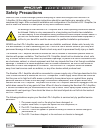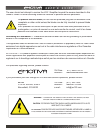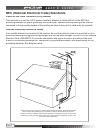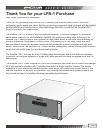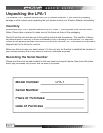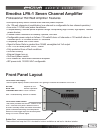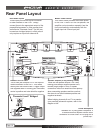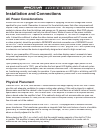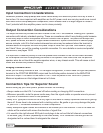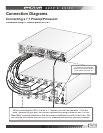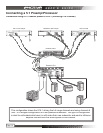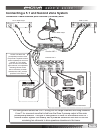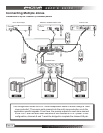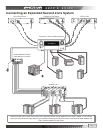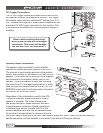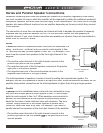
Page 12
Page 12
Input Connection Considerations
Whenever possible, keep preamp level audio cables away from electrical power cords by at least a
few inches. It’s more important with amplifiers as the AC power cords are carrying much more current
than other source and preamplifier components, which means there is a larger degree of noise or
“hum” potential with the amplifier power cord in close proximity.
Output Connection Considerations
The output connectors provided on each channel of the LPA-1 are standard “binding post” speaker
connectors with industry standard spacing. These are sometimes called 5-way binding posts because
of the many ways in which the speaker wire can connect into the posts. The posts can accept bare
wire, spade terminals, and dual or single banana connectors. Spade connections or banana plugs
ensure a simple, solid fit in the terminal whereas bare wire may be awkward when the terminal is
screwed down to compress the wire into place. Keep in mind that if you use “dual banana” plugs
and “stack” them, you will be creating a parallel connection. For more details on series and parallel
connections, see pages
19-20
.
It is important to observe polarity so that the speaker wire connects to the red and black terminals
on the amplifier and the corresponding terminals at the speaker. Also make sure that the positive
speaker wires do not touch the negative speaker wires, or any chassis metal. This will cause a short
circuit and activate the protection circuitry.
Bridging Channels 6 and 7
When you are using channels 6 and 7 in a bridged configuration, in which case the right side positive
terminal is the POSITIVE BRIDGED output and the left side positive terminal is the NEGATIVE
BRIDGED output. The switch on the back of LPA-1 must be placed in the “BRIDGED” position.
Minimum impedance on this bridged channel is 8 ohms.
Connection Tips for Superior Sound
Before setting up your new system, please consider the following:
•
Always make sure the LPA-1 is turned off before making or changing ANY connections.
• Whenever possible, route the power cords away from the signal cables or speaker wires to prevent
any hum or interference heard in the speakers.
• Many RCA type patch cords can be a very tight t and there is usually a preferred method of getting
them off. Some have to be removed with a twisting action. Be gentle or you may damage the jacks
of your LPA-1, the cables themselves, or other components.
• Many audiophile signal cables are intended to be hooked up in one direction. If this is the case the
cables will be marked with arrows the direction of signal ow.
• It is usual for the right channel RCA patch cord plugs to be red and the left channel connections
to be white, grey, or black (depending on the cable brand). RCA connectors that are gold will be
designated with a colored band to designate the channel.



